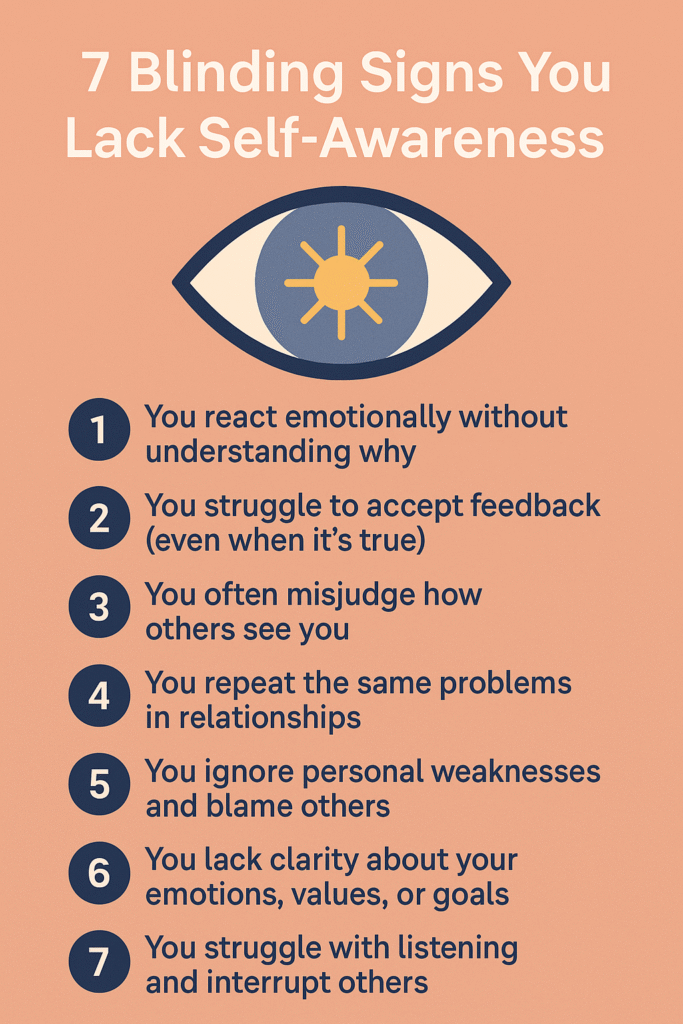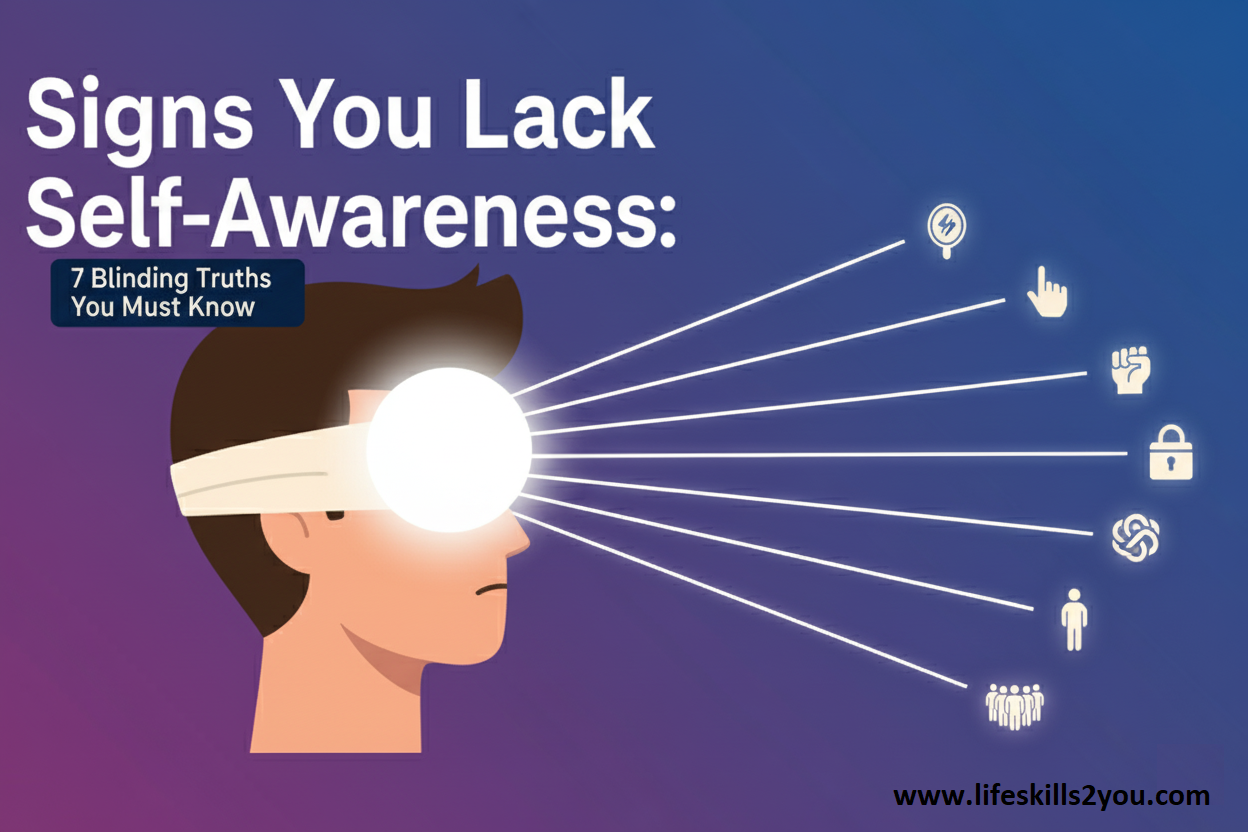Introduction
Discover key signs you lack self-awareness and learn science-backed strategies to improve emotional intelligence, relationships, and personal growth.
Have you ever walked away from a conversation and wondered, “Why do people react to me this way?” Or felt stuck in the same patterns no matter how hard you try to change? If so, you’re not alone. In my 12+ years as a life skills trainer and personal development coach, I’ve seen one recurring issue that quietly sabotages success, confidence, and relationships: a lack of self-awareness.
Most people believe they are self-aware. In fact, a study by organizational psychologist Dr. Tasha Eurich found that 95% of people think they’re self-aware — but only 10–15% actually are.
That shocking gap is where frustration, conflict, emotional stress, and stalled personal growth are born.
When you don’t recognize your emotions, blind spots, weaknesses, or behavioural patterns, you end up repeating the same cycles — sometimes for years. You may misread situations, misunderstand people, fail to grow, or unknowingly push others away. These patterns aren’t rooted in laziness or lack of intelligence — they are rooted in blindness.
And that’s why understanding the signs you lack self-awareness is a transformative first step.
Not to judge yourself.
Not to feel guilty.
But to finally illuminate the behaviour patterns blocking your growth so you can break free.
In this comprehensive, psychology-backed guide, we’ll dive deep into the 7 Blinding Signs You Lack Self-Awareness (And What to Do About It). You’ll find:
✔ Real-life coaching examples
✔ Behaviour science insights
✔ Emotional intelligence frameworks
✔ Easy, actionable steps
✔ Motivational quotes
By the end of this article, you’ll not only understand your blind spots — you’ll know exactly how to rise above them with clarity, emotional strength, and renewed personal power.
Let’s begin.

1. You React Emotionally Without Understanding Why
One of the strongest signs you lack self-awareness is reacting impulsively without recognizing the emotional trigger. This happens when your internal world controls you instead of the other way around.
Why This Happens (The Psychology Behind It)
According to the cognitive-behavioural model, emotions arise from thoughts — but when those thoughts are unconscious, the emotion feels “sudden” and uncontrollable.
You may feel:
- Angry without knowing why
- Anxious without a clear reason
- Irritated even in small interactions
- Defensive during feedback
- Hurt by neutral comments
This happens because your brain is operating on automatic emotional scripts rooted in past experiences.
Real-Life Example (Client Story)
During a corporate training session, I worked with a manager, let’s call her Priya. She often snapped at her team but insisted she was “just stressed.”
After coaching, she realized she felt threatened whenever someone questioned her ideas — not because they were wrong, but because she grew up being criticized harshly at home.
Her emotional reactions had nothing to do with her team — but everything to do with her past.
What to Do
- Name the emotion
- Ask: “What triggered me?”
- Track emotional patterns in a journal
- Pause for 10 seconds before reacting
- Use the CBT technique: Thought → Feeling → Behaviour
Motivational Quote:
“You cannot change what you refuse to acknowledge.”
2. You Struggle to Accept Feedback (Even When It’s True)
Do you feel attacked when someone gives you suggestions? Do you justify, argue, or shut down?
This is one of the most common signs you lack self-awareness — especially in professional settings.
Why Feedback Feels Like a Threat
According to Harvard Business Review, the brain interprets negative feedback as a threat to identity.
The less self-aware you are, the stronger the threat response.
Real-Life Example
A young entrepreneur I coached would get offended anytime investors or team members gave feedback. He believed feedback meant he wasn’t good enough.
Once he reframed feedback as data — not judgment — he started growing fast.
What to Do
- Remind yourself: Feedback is information
- Ask clarifying questions instead of defending
- Thank the person
- Implement one small action from the feedback
- Evaluate patterns across repeated feedback
3. You Often Misjudge How Others See You
One of the most eye-opening signs you lack self-awareness is the disconnect between how you think others perceive you vs. how they actually do.
People who lack self-awareness often believe:
- They are good communicators (but seem rude)
- They are calm (but appear cold)
- They are confident (but come across arrogant)
- They are helpful (but seem controlling)
This “self-other gap” is part of social psychology’s reflected appraisal theory, which explains that we form our identity based on how we think others see us — but we often misinterpret it.
Real-Life Example
During a leadership training, one participant believed he was an “approachable leader.”
But 7/10 employees said they were afraid to speak to him because of his strict tone.
This was a powerful wake-up moment that helped him transform his leadership style.
What to Do
- Ask 3 trusted people: “How do I show up?”
- Use anonymous surveys (great for work)
- Record yourself speaking and observe body language
- Accept that perception is reality in relationships
4. You Repeat the Same Problems in Relationships
If you keep experiencing:
- The same arguments
- The same breakups
- The same miscommunications
- The same emotional patterns
…these are strong signs you lack self-awareness in relationships.
Behaviour Science Explanation
People repeat relational patterns because of subconscious attachment styles, learned behaviour, and emotional wounds.
Without self-awareness:
- You attract similar partners
- You make similar mistakes
- You hold the same beliefs
- You respond with the same emotional habits
Real-Life Example
A coaching client kept dating emotionally unavailable partners. She insisted, “All men are the same.”
Through deep introspection, she realized she herself feared intimacy — so she subconsciously chose partners who couldn’t get close.
What to Do
- Identify recurring patterns
- Understand your attachment style
- Track emotional triggers
- Seek emotional intelligence training
- Learn reflective communication
5. You Ignore Personal Weaknesses and Blame Others
People who lack self-awareness often externalize problems:
“It wasn’t my fault.”
“They misunderstood me.”
“I didn’t do anything wrong.”
This avoidance protects the ego — but destroys growth.
Psychological Insight
This is linked to the self-serving bias, a cognitive bias where you credit yourself for successes and blame others for failures.
Real-Life Example
I once coached a team leader who blamed poor team results on “lazy team members.”
But after a performance audit, he discovered the real issue was his unclear communication and lack of follow-up.
This realization changed everything.
What to Do
- Ask: “What part of this is in my control?”
- Identify your role in every conflict
- Accept that weakness ≠ failure
- Use self-assessment tools (Johari Window, MBTI, EI scales)
6. You Lack Clarity About Your Emotions, Values, or Goals
If you don’t know:
- What you want
- What motivates you
- What drains you
- What your values are
- What direction you’re moving in
…these are powerful signs you lack self-awareness.
Why This Happens
Many people live on autopilot — influenced by society, family expectations, and comparison culture.
Without clarity:
- Decisions feel heavy
- Motivation drops
- Purpose feels missing
- Emotional confusion increases
Real-Life Story
A young professional I worked with jumped from job to job feeling unfulfilled.
He thought something was wrong with his career — but the real issue was that he didn’t know his values.
Once we identified his core values (creativity, autonomy, impact), he finally found a career that fit him.
What to Do
- Write your top 5 values
- Reflect weekly on emotional highs and lows
- Journal: “What do I want?”
- Set 90-day goals
- Conduct a monthly self-audit
7. You Struggle With Listening and Interrupt Others
Poor listening is one of the strongest signs you lack self-awareness because it shows a lack of presence.
Why This Happens
People interrupt because they are:
- Preparing responses
- Seeking validation
- Feeling insecure
- Distracted
- Avoiding discomfort
Real-Life Example
During communication training, I met a participant who constantly interrupted others without realizing it.
Once she watched a recording of herself, she was shocked — and immediately started improving.
What to Do
- Pause 2 seconds before responding
- Listen to understand, not respond
- Take notes during conversations
- Validate what the other person said
- Use the “Tell me more” technique
To Get More insights You Maye Refer This External Resources
✔ Harvard Business Review – “Self-Awareness Can Help Leaders More Than an MBA”
https://hbr.org
✔ Positive Psychology’s guide on self-awareness
https://positivepsychology.com
Conclusion
Self-awareness isn’t a skill you master once — it is a lifelong journey. The more you understand your thoughts, emotions, triggers, patterns, and relational behaviours, the more power you gain over your life.
By recognizing these 7 blinding signs you lack self-awareness, you open the door to stronger relationships, clearer goals, emotional freedom, and lasting personal growth.
Remember:
Self-awareness is not about judging yourself — it’s about discovering yourself.
Every great leader, communicator, and emotionally intelligent person began with a single brave step: the willingness to look within.
If you commit to even one strategy from this guide, you’ll notice powerful changes in the way you think, feel, and connect with others.
Thank you for exploring this insightful article.
If you’re hungry for more knowledge, don’t miss out on our other engaging articles waiting for you. Dive into our treasure trove of wisdom and discover new perspectives on related topics.
Click ‘Our Blog’ and ‘How to Guide’ to embark on your next adventure.
Happy reading!
FAQs On Signs You Lack Self-Awareness: 7 Blinding Truths You Must Know
1. What is self-awareness in simple terms?
Self-awareness is the ability to understand your thoughts, emotions, behaviours, and how they influence your life and relationships. It’s the foundation of emotional intelligence.
2. Why do most people lack self-awareness?
Because emotions and behaviours are often unconscious. People operate on autopilot, shaped by conditioning, habits, and emotional wounds.
3. How do I know if I lack self-awareness?
Look for patterns like repeating conflicts, emotional overreactions, defensiveness, miscommunication, or not understanding your triggers.
4. Can self-awareness be learned?
Absolutely. With reflection, feedback, journaling, mindfulness, and emotional intelligence training, self-awareness improves significantly.
5. Why does feedback hurt?
Feedback threatens your identity. When self-awareness is low, the ego feels attacked, leading to defensiveness.
6. How do I become more self-aware daily?
Practice mindfulness, ask for feedback, journal emotions, pause before reacting, and track behaviour patterns.
7. Is self-awareness related to mental health?
Yes. Higher self-awareness improves emotional regulation, reduces stress, and builds resilience.
8. Can self-awareness improve relationships?
Definitely. When you understand your triggers and behaviour patterns, communication, trust, and empathy naturally strengthen.
9. What tools help develop self-awareness?
CBT worksheets, emotional journals, values assessments, feedback surveys, coaching, meditation, and personality tools.
10. How long does it take to develop self-awareness?
It varies — but consistent practice can show visible improvements within weeks.

